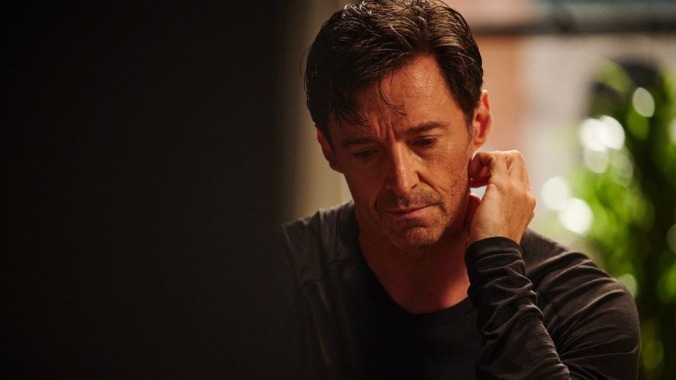The Son never rises, despite stirring performances from Hugh Jackman and Laura Dern
Director Florian Zeller's follow-up to his Oscar winner The Father offers simplistic solutions to complex mental health issues
Film Reviews laura dern
The Son is the latest addition to a recent crop of movies to present grief and trauma in ways that imply that Hollywood is the first to ever discover both. Writer-director Florian Zeller’s overwrought and underwhelming follow-up to his Oscar-winning The Father is a bleak, TV movie-level affair that’s convinced it’s a legit awards contender. The filmmaker doubles down on his lack of awareness for most of The Son’s dour, surface-level exploration of depression. Despite the shallow handling of truly important and nuanced subject matter, Hugh Jackman, Laura Dern and a scene-stealing Vanessa Kirby go deep with their performances in ways that almost make The Son’s manipulative and predictable story worth sitting through—almost.
Movies often depict mental health struggles in the most stereotypical or exaggerated ways; whole generations of people have based their understanding of them on the often inaccurate—and, at times, offensive—representations that they’ve seen in movies. The Son’s reach falls frustratingly short of its grasp in terms of adding any nuance to those depictions, here embodied in the story of teenager Nicholas Miller (Zen McGrath) and his parents, Kate (Dern) and Peter (Jackman).
Several years after Kate and Peter’s divorce, Nick wants to stop living with his mom and move in with his dad, who recently had a baby with his new partner, Beth (Vanessa Kirby). Nick’s decision is seemingly sparked by depression, but the movie fails to articulate in any substantive way exactly what that looks or feels like other than Nick describing the oppressive weight of life, which inspires him to skip school and roam the streets of New York trying to, well, I’d say “make sense of it all,” but that’s not what the movie chooses to do. Or perhaps knows how to do.
Zeller makes emotionally dishonest and cliched choices in dramatizing Nick’s mental health and his family’s response to it. He elicits sympathy—to an extent —by dramatizing both Nick’s struggle to accept that his sad thoughts and feelings aren’t representative of reality, and his father’s inability to prioritize his son’s discomfort over his own. Validating his son’s painful thoughts seems to be the path the story is setting up for Peter—which would have offered a refreshing or, at the very least, more “realistic” drama. Instead, Peter approaches his son’s plight with little more than positive thoughts and good vibes to cure whatever ails his once carefree son.
Further, the movie all but blames Nick’s suffering for why his Dad must now grapple with some of his own, a backwards and irresponsible handling of the serious issues and themes upon which The Son is built. That porous foundation, comprised of black-and-white binaries, fails to service the very grey area in which mental health is assessed, and especially treated.
Where The Father depicted a genuine, empathetic portrayal of an elderly man (Sir Anthony Hopkins) living with dementia, The Son affords depression none of the same care or understanding. (Even The Father found moments of genuine levity to punctuate the serious subject matter; The Son just stays stuck in “Serious Mode.”)
Jackman delivers a vulnerable and dynamic performance, despite the two-dimensionality of his character. Given Zeller’s success in putting another Best Actor trophy on Hopkins’ mantle, you can see why an actor would partner with him, but Jackman’s impressive work deserves a story more worthy of it. Same for Dern and Kirby, who are fiercely committed to giving compelling performances, despite the script’s deficiencies. Kirby especially shines with what is arguably her best work to date, as her character stares down the barrel of new motherhood with the growing realization that raising a child is a game of inches. The only victory is accepting the fact that some days you might lose—and that’s okay as long as you start fighting again on the next one.
What isn’t okay, however, is The Son’s flat, finger-pointing approach to an affliction that impacts countless families, and frequently in ways that can’t be easily diagnosed or resolved. If mental health treatment is less of a discussion of “right or wrong” than identifying behaviors as “effective or ineffective,” and finding a middle path—warts and all—that hopefully leads toward recovery or, at the very least, mitigation, this film is deeply ineffective, to say the least. Severe depression is a struggle that deserves more compassion and care than Zeller and his film are able to give, which leaves audiences wishing the director didn’t bother at all.
13 Comments
I’m just here to watch the entire page get gradually taken over by banner ads. I also like it when somebody shouts THE CALLISTO PROTOCOL at me, so it’s a total win/win.
Better than the month the top half of Justin Long’s stupid face dominated the site.
I have a feeling you are going to LOVE Barbarian!
Oh great. Another movie that could have been about cool superheroes, but is all about stupid regular people and their stupid feelings instead.
I blame Martin Scorsese.
shame. the father really surprised me.
“Mother!” surprised the shit out of me, but I’m not sure that’s in the Family Cinematic Universe.
That doesn’t mean they can’t make for a great double feature!
Put this with “Fleishman is in Trouble” and “Only Murders in the Building” as projects about banal rich people that I don’t care about. Every film or show is about wealthy white people more and more
White Lotus is pretty good.
Ah, so after Hugh saw the rushes of this, he realized he’d have to return to Wolverine again to pay for his new house.
Counterpoint: The Father sucked.
*Sighs in mental health professional*